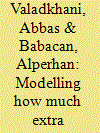| Srl | Item |
| 1 |
ID:
178818


|
|
|
|
|
| Summary/Abstract |
Market efficiency is distorted when retailers are unwilling to pass on changes in wholesale costs or the price of oil (as a major production input cost) to motorists. Existing approaches to measuring pass-through parameters may obscure such behaviour because of the use of fixed-parameter models and/or aggregated price data across different locations and brands over time. We contribute to the literature by examining if there is a mismatch between wholesale and retail petrol prices across different brands supplying unleaded petrol within the same geographical location. To do so, we examine the effects of upstream shocks, arising from changes in oil or wholesale petrol prices, on the retail petrol prices of 672 stations in Sydney, Australia's largest city. We find that the pass-through parameters are significantly lower for stations with fewer competitors in their immediate proximity. When there are fewer than 13 petrol stations within a 5-km radius, or 33 stations within 10 km, irrespective of their brand, they become increasingly less responsive to changes in the wholesale petrol price or the price of crude oil. Our findings enhance market transparency and provide regulators with a rule of thumb that allows them to monitor the unleaded petrol market more effectively.
|
|
|
|
|
|
|
|
|
|
|
|
|
|
|
|
| 2 |
ID:
132653


|
|
|
|
|
| Publication |
2014.
|
| Summary/Abstract |
Gross profitability margin (difference between retail and wholesale prices) for unleaded petrol exhibits substantial variations across 108 cities, towns and regional centres in Australia. This paper examines if such variations (averaged during 2007-2012) can be explained by (a) transport costs proxied by the distance between retailers and wholesalers; (b) the size of the retail market; (c) market competition proxied by the number of cars in the vicinity of the retailers; (d) dummy variables capturing other qualitative attributes associated with the retailers' locations. Three cross-sectional regressions are estimated but only one successfully passes all diagnostic tests. By identifying a number of locations exhibiting excessive profit margins, the results of this paper enhance the efficiency and transparency of petrol pricing in the retail market. It is found that the extent of excessive profiteering in Western Australia (WA) and South Australia (SA) were lower than other Australian states and territories. This important finding can be explained by a strong presence of independent petrol stations in SA and the successful price-monitoring performance of FuelWatch in WA.
|
|
|
|
|
|
|
|
|
|
|
|
|
|
|
|
| 3 |
ID:
166452


|
|
|
|
|
| Summary/Abstract |
We propose a new approach to identify pathways for countries to reduce carbon dioxide emissions (CO2) per capita through possible changes in their energy consumption portfolio. Utilizing data from the last half century (1965–2017) for 79 countries, we investigate how changes in the composition of primary energy consumption (i.e. oil, coal, gas and renewables) can contribute to changes in per capita CO2 emissions, depending on the time-varying level of individual countries’ real per capita income. To this end, threshold panel regressions (with common and fixed effects) are estimated to endogenously determine an unknown number of possible pathways (delineated by break points) to reduce emissions. This study provides important policy insights into the effects of switching from one source of primary energy consumption to another on per capita emissions, as nations progress through stages of economic development. Such relative costs can be compared and contrasted (a) across country groupings, (b) through time, as real per capita income changes, and (c) with those of other country groupings that fall within similar per capita income brackets.
|
|
|
|
|
|
|
|
|
|
|
|
|
|
|
|
| 4 |
ID:
121330


|
|
|
|
|
| Publication |
2013.
|
| Summary/Abstract |
This study addresses a very significant policy issue not previously examined at a disaggregated level for Australia by identifying on which day(s) petrol is more expensive and in which locations discount days are non-existent. After conducting a time series analysis of the day of the week effect in retail prices of unleaded petrol in 114 locations across Australia (Jan 2005 to Apr 2012), it is observed that prices mostly peak on Thursday/Friday and then decline until they hit their cyclical trough mainly on Sunday/Tuesday. However, these daily differences are only statistically significant in capital cities or large regional centres. A cross-sectional analysis of the mean prices during the period Nov 2007 to Feb 2012 shows that (a) in remote and less populous locations, where sales are presumably limited and overhead costs are high, petrol is more expensive; (b) petrol generally costs more in places which exhibit less price variability. The disaggregated and location-specific results can increase our understanding of Australia's retail petrol market and can be beneficial to motorists as well as various government and non-government organisations such as the ACCC (Australian Competition and Consumer Commission), AAA (Australian Automobile Association) and FuelWatch.
|
|
|
|
|
|
|
|
|
|
|
|
|
|
|
|